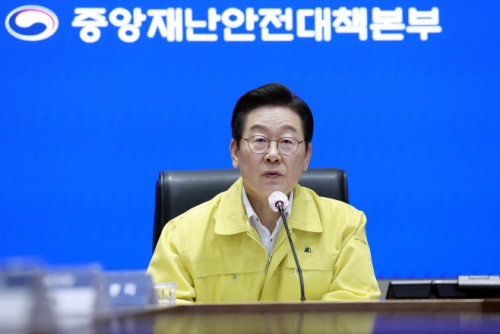 |
| President Lee Jae-myung speaks during an emergency meeting at the Government Complex in Seoul on September 28, following the fire at the National Information Resources Service in Daejeon. / Source: Yonhap News |
President Lee Jae-myung on September 28 presided over a 160-minute emergency meeting in Seoul following the fire at the National Information Resources Service in Daejeon, pressing officials on the government’s slow response and lack of contingency planning.
Lee ordered ministries to prioritize the restoration of essential public services such as welfare payments and passport issuance “even if it takes working through the night.” He added, “This fire must serve as a turning point to fundamentally strengthen the safety of our national digital infrastructure. Secure the necessary budget and manpower without delay.”
The president sharply criticized the absence of backup systems, recalling a similar nationwide IT outage in 2023. “It is astonishing that no dual-operation system exists for such a critical network. Two years have passed since the last crisis, yet nothing was put in place. This cannot be explained away,” he said.
Lee noted that initial assurances of a three-hour recovery had proven hollow, with services still disrupted nearly two days later. “Running such a vital national system without redundancy is like driving without a map,” he told officials after some were unable to clearly explain existing protocols.
He emphasized that national digital infrastructure is “an essential security asset and the lifeblood of citizens’ daily lives,” ordering all ministries to re-examine regulations, governance, and backup operations from the ground up. He further directed the presidential National AI Strategy Committee to lead a task force, including private-sector experts, to rapidly devise new safeguards.
To ease public inconvenience, Lee accepted a proposal from Gyeonggi Governor Kim Dong-yeon to temporarily waive administrative service fees, instructing the interior ministry and finance ministry to allocate emergency funds.
“All measures must be excessive rather than insufficient when it comes to safety and security,” Lee said. “It is unacceptable to neglect what is necessary simply because of cost or inconvenience.”
Most Read
-
1
-
2
-
3
-
4
-
5
-
6
-
7





















